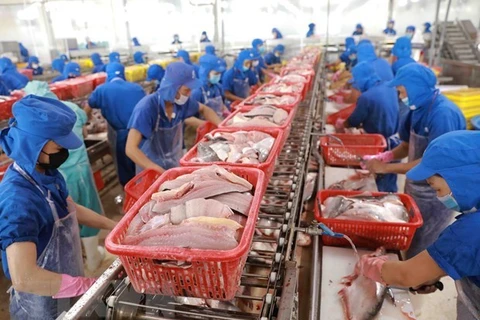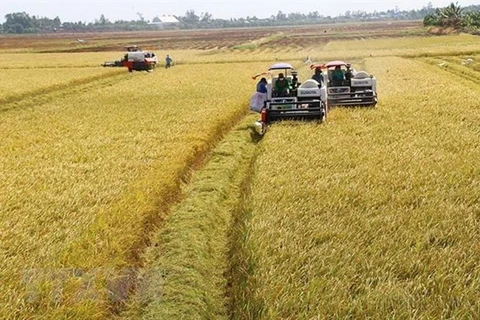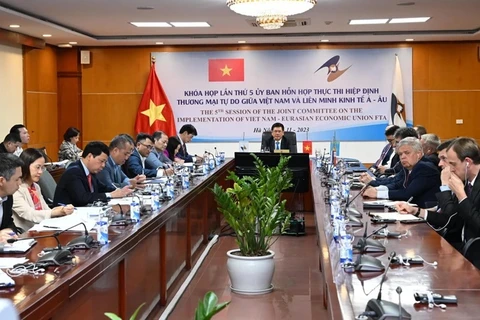 Developing human resources experts and increasing the effectiveness of FTA implementation is a must for Vietnam in the coming years. (Photo: VNA)
Developing human resources experts and increasing the effectiveness of FTA implementation is a must for Vietnam in the coming years. (Photo: VNA) Many participants said Vietnam is in dire need of qualified personnel to implement new generation FTAs.
According to them, FTAs have contributed to promoting Vietnam's institutional and policy reform, creating motivation for innovation and improving the competitiveness of Vietnamese goods and businesses. However, human resources, especially FTA implementation experts, are still very limited and do not meet the requirements.
Le Thi Hang, Deputy General Director of the Detech Coffee Joint Stock Company, said that with FTAs, her company has faced difficulties in finding experts to train the staff of the import-export department.
Currently, our company is looking for experienced experts in FTAs to advise the staff on risk management measures, especially FTAs relating to regulations on labour, environment and intellectual property, she said.
Nguyen Thi Lan Phuong, deputy head of the WTO and FTA Department, Multilateral Trade Policy Department of the Ministry of Industry and Trade (MoIT), said that Vietnam has been implementing 15 FTAs. Among them are three new-generation FTAs, including the Comprehensive and Progressive Agreement for Trans-Pacific Partnership (CPTPP), the Vietnam - EU Free Trade Agreement (EVFTA) and the Vietnam - United Kingdom Free Trade Agreement (UKVFTA).
These FTAs include not only traditional fields but also non-traditional fields such as labour, environment and intellectual property. Therefore, commitment content is relatively complex and has many high standards, requiring the human resources team to have a deep understanding of commitment content to help management agencies and businesses at the local level understand FTA commitments properly and fully implement the commitments.
Phuong stressed that currently, based on the Prime Minister's direction, the MoIT is assigned to proactively work with relevant ministries and branches to develop training programmes as well as guide State management agencies and businesses to better take advantage of FTAs.
In the coming time, the MoIT will firmly implement work towards building better human resources for Vietnam in the immediate and long term to take advantage of FTAs, she added.
Statistics showed that the Government, ministries, branches, localities, associations and businesses have made great efforts to work together to improve the effectiveness of implementing these FTAs. However, the utilisation rate of these FTAs is still relatively limited.
For FTAs with good results such as EVFTA, the utilisation rate is only about 26% and FTAs like CPTPP are only achieved at 5%. These are modest numbers compared to the space and opportunities these FTAs offer, according to Phuong.
In the immediate future, the MoIT is currently coordinating with its Central School of Industry and Trade Training to develop a framework of training documents for FTA experts in efforts to build training materials for exporters and importers supporting sustainable development.
In 2023, based on a survey of the needs of provinces and cities, the MoIT will also initially pilot training the first expert classes to be able to provide human resources immediately for provinces, cities and consultants to support businesses.
In the long term, the MoIT will conduct a survey of businesses with import and export activities in markets, especially FTA markets. The ministry will also carry out a pilot project with a number of universities that have majors in economics and especially international trade to jointly consider and review the training content in the schools.
At the recent meeting of the Steering Committee for International Economic Integration, Deputy Prime Minister Tran Hong Ha also requested to strengthen consultations for the business community and industry associations during the process of implementing commitments to international economic integration and FTAs implementation./.
VNA























